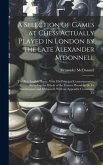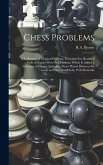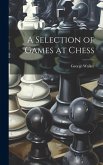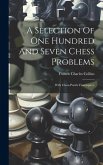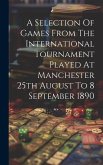Dive into the intricate world of correspondence chess with "A Selection Of 200 Games Of Chess," meticulously compiled by George Brinton Fraser. This collection offers a fascinating glimpse into the strategic depths of chess played over distance and time. Each game is accompanied by insightful notes and critical remarks, providing valuable lessons and historical context for chess enthusiasts and serious players alike. Fraser's work captures the essence of 19th-century chess culture, presenting a unique opportunity to study classic games and understand the evolution of chess strategy. Whether you are a seasoned chess player seeking to expand your knowledge or a history buff interested in the intellectual pursuits of a bygone era, this book offers a rich and rewarding experience. Discover the enduring appeal of chess through this carefully curated selection of games, preserved for generations to come. This work has been selected by scholars as being culturally important, and is part of the knowledge base of civilization as we know it. This work was reproduced from the original artifact, and remains as true to the original work as possible. Therefore, you will see the original copyright references, library stamps (as most of these works have been housed in our most important libraries around the world), and other notations in the work. This work is in the public domain in the United States of America, and possibly other nations. Within the United States, you may freely copy and distribute this work, as no entity (individual or corporate) has a copyright on the body of the work. As a reproduction of a historical artifact, this work may contain missing or blurred pages, poor pictures, errant marks, etc. Scholars believe, and we concur, that this work is important enough to be preserved, reproduced, and made generally available to the public. We appreciate your support of the preservation process, and thank you for being an important part of keeping this knowledge alive and relevant.
Bitte wählen Sie Ihr Anliegen aus.
Rechnungen
Retourenschein anfordern
Bestellstatus
Storno


